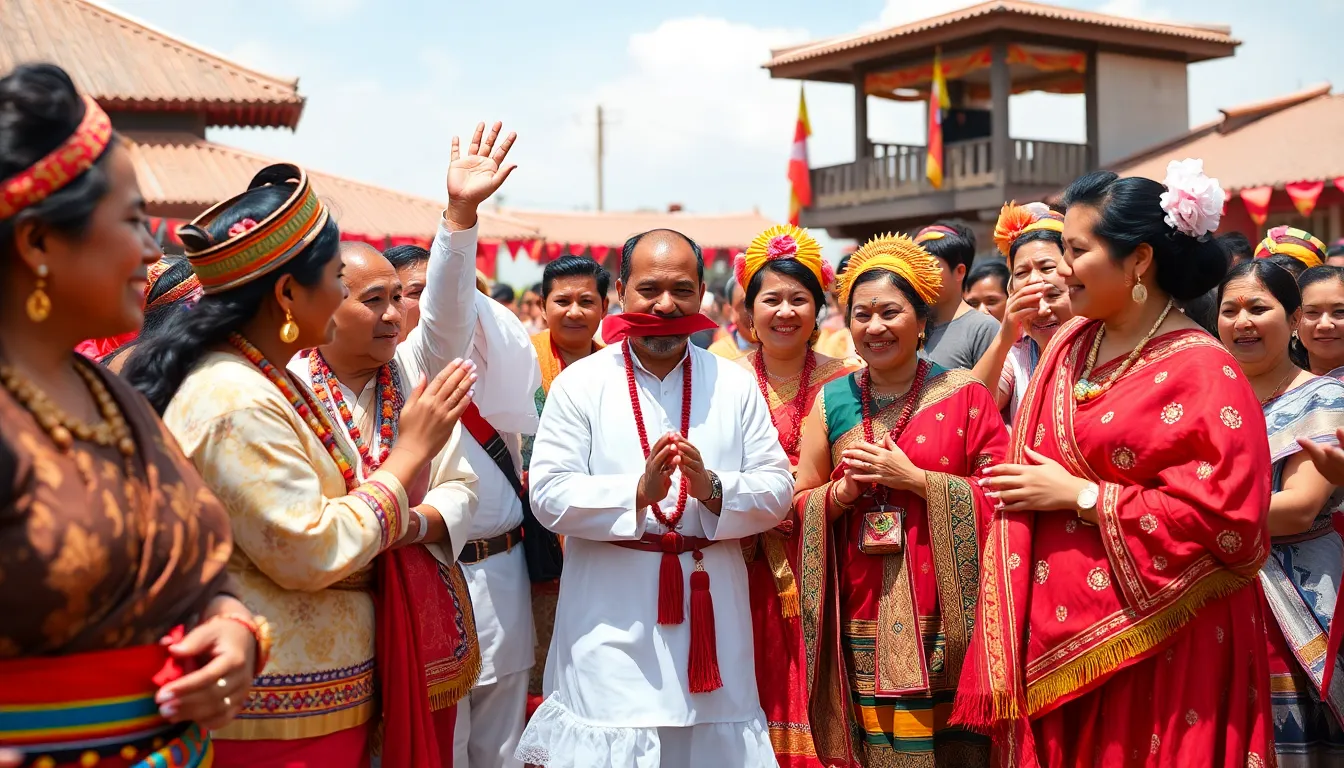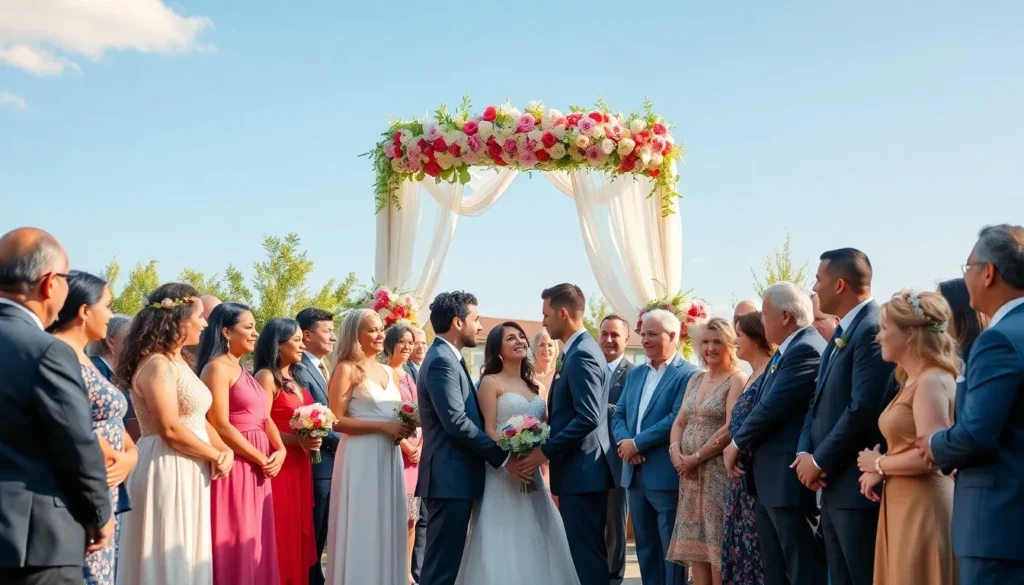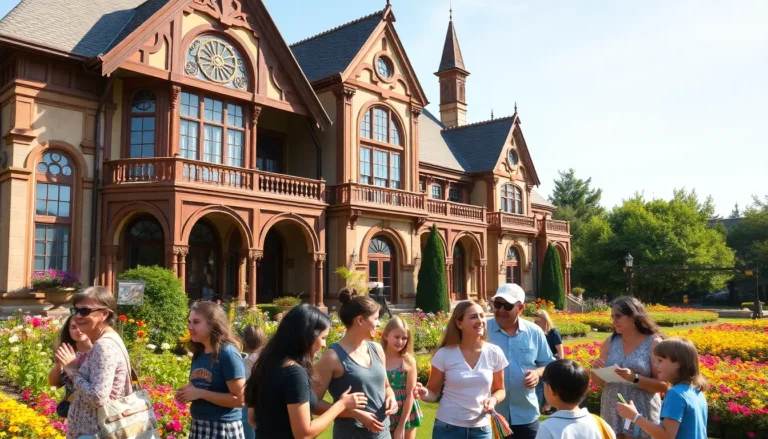Table of Contents
ToggleCeremonies are like the confetti of life—colorful, celebratory, and often a bit messy. Whether it’s a wedding, graduation, or a quirky family reunion, these events mark significant moments that deserve more than just a passing glance. They’re the glue that holds together our shared experiences and emotions, turning ordinary days into unforgettable memories.
Understanding Ceremony
Ceremonies serve as significant markers in human life, celebrating key experiences and fostering connections. They bring people together, creating lasting memories that resonate through time.
Definition and Importance
A ceremony refers to a formal event or ritual that recognizes important life milestones. These events carry deep cultural, spiritual, or personal meaning. Celebrating weddings symbolizes the union of partners. Graduation ceremonies highlight academic achievements and transitions into new life phases. Family reunions strengthen bonds, emphasizing togetherness and shared history. Such ceremonies enhance emotional connections, offering support and joy during pivotal moments.
Types of Ceremonies
Ceremonies span various categories, each representing different occasions. Religious ceremonies, including baptisms and confirmations, mark spiritual commitments. Civic ceremonies often include award presentations, demonstrating community recognition. Milestone events like anniversaries celebrate relational milestones. Cultural ceremonies, such as quinceañeras and bar mitzvahs, honor specific traditions and customs. New beginnings are marked by housewarming ceremonies, welcoming friends and family into new spaces. Each ceremony type plays a vital role in enriching life experiences and promoting social cohesion.
Cultural Significance of Ceremony

Ceremonies play a pivotal role in expressing cultural values and beliefs. They mark transitions and celebrate pivotal moments across diverse communities.
Ceremonies Across Different Cultures
Ceremonies vary significantly among cultures, reflecting unique traditions and values. Indigenous peoples often hold elaborate rituals tied to the seasons or life events, such as birth and death. In contrast, Western cultures celebrate milestones like weddings and graduations with formal events. Asian cultures emphasize ceremonies, such as the tea ceremony, to honor familial bonds and respect. Each cultural ceremony adds depth to the shared human experience, demonstrating the richness of global heritage.
Impact on Community and Identity
Communities often find their identity through ceremonies. Collective celebrations foster unity and strengthen bonds among individuals. Rituals such as religious gatherings or cultural festivals reinforce a sense of belonging, enhancing social ties. These events serve as platforms for individuals to express their shared values and beliefs, promoting cultural continuity. Ceremonies create opportunities for storytelling and sharing experiences, allowing communities to connect with their history and heritage. As such, they play a crucial role in shaping individual and collective identities.
Ceremony in Modern Society
Ceremonies remain vital in modern society, connecting individuals and communities through shared experiences and meaningful traditions. Celebratory events highlight significant life moments, serving as a bridge between the past and present.
Evolution of Traditional Ceremonies
Traditional ceremonies have undergone significant transformation. Over time, many societies have adapted rituals to align with contemporary values. Certain cultural practices now blend with modern elements, making them more accessible. Traditional weddings often include personalized vows, while religious ceremonies may incorporate technology such as multimedia displays. Communities continue to cherish these evolving traditions, ensuring they remain relevant and resonate with new generations.
Contemporary Ceremonies and Their Relevance
Contemporary ceremonies now reflect the diversity of modern lives. Events like baby naming ceremonies and personalized milestone celebrations emphasize individuality. Many people seek to create meaningful experiences that resonate with their beliefs and lifestyles. Ceremonies provide a platform for sharing personal stories, fostering connections, and promoting unity among participants. These events not only commemorate transitions but also reinforce community identity and shared values.
The Role of Ceremony in Life Events
Ceremonies play a vital role in recognizing life events, fostering connections, and marking significant transitions. They serve not only as celebrations but also as communal experiences that reinforce shared values and traditions.
Ceremonies for Milestones
Celebrations like weddings, graduations, and anniversaries highlight important milestones in life. Each ceremony represents a unique step in an individual’s journey, often accompanied by traditions that enhance emotional significance. For example, a wedding ceremony unites families and friends, emphasizing love and commitment. Graduations signify academic achievement, bringing together peers and family in shared pride. Milestone ceremonies also offer opportunities for reflection, allowing individuals to consider their past while looking forward to future possibilities.
Symbolic Gestures in Ceremonies
Symbolic gestures enrich ceremonies with deeper meaning and emotional resonance. Lighting candles often represents hope and remembrance, creating an atmosphere of reflection during events like memorials. Releasing doves signifies peace and freedom, typically seen in weddings or memorial services. Other gestures, such as exchanging rings or sharing a toast, create moments of connection among participants. These rituals forge bonds between individuals while enhancing the collective experience of the ceremony. They affirm the significance of the occasion and ensure lasting memories for all involved.
Ceremonies play a crucial role in shaping individual and collective identities. They connect people through shared experiences and traditions that resonate deeply within communities. As life unfolds, these events mark significant milestones while honoring cultural values and beliefs.
In an ever-evolving world, ceremonies adapt to reflect contemporary values while maintaining their emotional significance. Whether through personalized vows or unique rituals, they continue to foster connections and create lasting memories. Ultimately, ceremonies remain a vibrant expression of life’s journey, celebrating transitions and reinforcing the bonds that unite us all.







